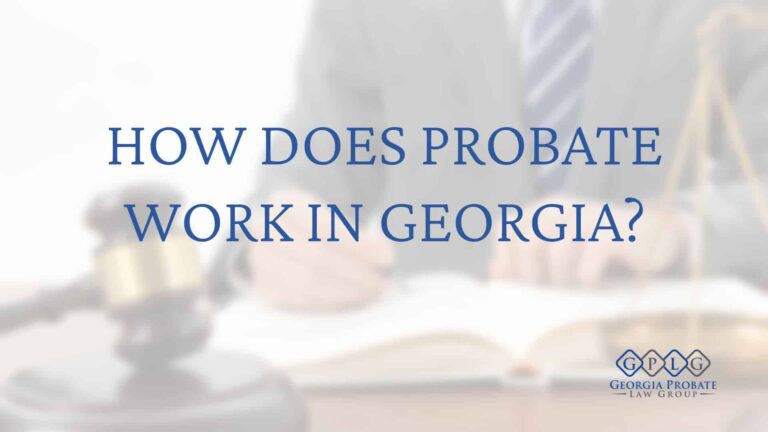Often, the heirs of a deceased person wonder how long does the executor have to pay the beneficiaries. However, you should know that several factors – such as the complexity of the estate, the deceased’s debts, estate taxes, and any legal issues – influence the timing of the distribution of assets.
What are the duties of an executor? What steps need to be completed before receiving your share of an inheritance? And how long does the whole estate administration process take? These are just some of the questions we answer in this article.
The Main Responsibilities of an Executor in Georgia
If you are the executor of an estate, your core duty is to follow the late decedent’s wishes as stated in the will.
In a nutshell, the common responsibilities that come with an estate administration may include:
- acting in the best interest of the beneficiaries.
- collecting and safeguarding the estate’s assets.
- notifying creditors and handling the deceased’s debts.
- distributing the estate assets according to Georgia Law and the will.
- keeping beneficiaries informed and reporting when required.
- seeking discharge after estate affairs are resolved.
Fulfilling these duties implies a call for knowledge of the probate laws and paying attention to the legal procedures.
Asset Distribution Timeline in Georgia
According to Georgia estate law, the deceased’s asset distribution can be broken into three stages, each of them with its own timeline:
Appointment (between 6 weeks and 3 months)
During this stage, the court designates a personal representative to manage the inheritance and distribute the decedent’s assets. If they disagree, heirs and beneficiaries may object to the estate executor.
However, several factors – such as how promptly family members submit the required paperwork and the estate’s location – can affect the length of the appointment phase. Various courts may also have different processing speeds, impacting the probate timelines.
Estate administration (minimum of 4 months)
Most of the work is done here, such as identifying and notifying creditors, gathering assets, finding the heirs and beneficiaries, and paying all the estate debts.
Distribution and discharge (between 6 weeks and 3 months).
During this stage, the personal representative distributes the remaining assets to heirs and beneficiaries and closes the estate.
Note: ** You should be aware that the estate’s complexity and any disputes among beneficiaries can impact the probate process and may add extra steps to the procedure.
Tasks to Complete Before Paying Beneficiaries
01. Becoming formally appointed to the estate as the executor or administrator
Being named on the will as a personal representative does not automatically authorize a person to act as executor. Before handling the estate settlement, he or she must await official confirmation.
The court must appoint them first legally, or they’ll risk liability for any harm caused to the estate under the legal doctrine of executor de son tort (which translates to “executor of his own wrong”).
This term refers to a person who wrongfully inter-meddles with or converts the assets of an estate. Doing this in bad faith can make them accountable to the heirs for double the property’s value.
02. Run a creditor/debtor ad in the newspaper for four weeks and then wait three additional months to allow time for creditors to come forward
Once appointed, the executor should run a creditor/debtor ad in the local newspaper to give proper notice that the estate has opened, and the creditors may come forward to file a claim.
When creditors submit their requests, the personal representative must pay them according to a creditor priority system in Georgia. As a rule, the executor must pay all the debts, estate expenses, and tax obligations from the assets before paying beneficiaries and heirs.
03. Gathering and protecting the estate’s assets, including setting up an estate bank account
The executor should ensure that all estate assets are accounted for and secured.
These possessions may include bank accounts, investment accounts, real estate or other properties, vehicles, jewelry, or other deceased personal belongings.
The personal representative will be responsible for establishing an estate bank account to hold the collected funds.
They should also always keep a detailed estate inventory to address any potential legal or administrative issues. Such as if some heirs feel they need to be compensated reasonably or question their share of assets from the estate.
The executor/administrator must always keep a detailed estate inventory to deal with any problems during this legal process. Such as the possibility that some heirs may feel they need to be more reasonably compensated or question their share of the estate assets.
04. Reporting on the estate when required
When the probate court demands the executor to file for a bond, prepare inventories, and prepare annual returns, they must promptly comply.
05. Make proper distributions according to Georgia probate law and the will
The executor is responsible for deciding which property to sell and which to keep before distributing assets. Either way, they must treat their beneficiaries equally and follow Georgia law when making decisions.
For example, if the estate has run out of liquid assets and the executor still must pay debts, he may have to sell the tangible personal property to pay them.
The heirs and beneficiaries will receive their portion of the estate during the final phase of the probate process, known as distribution.
Executor’s Payment Schedule to Beneficiaries
– How long do executors have to pay bequests?
There is no specific deadline for the executor to pay the bequests.
In Georgia, several factors influence how long does the executor have to pay the beneficiaries:
- the complexity of the estate
- the duration of each phase of settling the estate
- where they are in the probate process
- whether issues come up anywhere during the probate process.
– What if there is not enough money to pay bequests straight away?
An estate may be considered insolvent if it doesn’t have enough money to pay beneficiaries.
In Georgia, the executor or administrator must perform an estate valuation and identify and pay all outstanding debts from the deceased’s inheritance. These obligations may include credit card balances, funeral and burial costs, medical bills, mortgages, federal estate taxes, and other tax obligations.
If there is not enough money to cover debts, the executor or administrator has to sell assets at a fair market value to cover the outstanding debts during the administration process.
If debts still exceed the assets, the estate may be considered insolvent, and beneficiaries may not receive any inheritance.
– What if there are unreasonable delays?
When the executor’s lack of action persists, he doesn’t provide comprehensive estate administration services, and a considerable amount of time has passed, you can file a request with the probate court to appoint someone to represent the estate. The new representative can compel the executor to bring the original will to court if it still needs to be done.
If an appointed executor refuses to cooperate, you may consider petitioning the probate court to request an estate accounting or even the executor’s removal.
When you face this situation, your best option is to seek legal advice from a probate attorney.
Challenges in Paying Beneficiaries
01. Family disputes
The emergence of inheritance disputes in Georgia may prolong the duration of the probate process and estate administration.
So, how long does probate take if disputes arise?
Depending on many factors, probate disputes may add months or years to the typical timeline.
These factors can include:
- the court calendar and when the court can hear the case.
- whether the parties are open to a settlement.
- the number of disputes that come up in the estate.
Parties’ willingness to settle disagreements can help expedite the probate process.
02. Estate size and complexity
The size and complexity of an estate play a critical role in determining how long the probate process takes.
Generally, smaller estates without disputes and complications are settled more quickly, while larger estates with beneficiary disputes may take years to resolve.
03. Speed of probate court
The probate court’s involvement in the process can affect the overall timeline needed before paying beneficiaries.
04. Creditors
Once appointed, the executor should run a creditor/debtor ad in the local newspaper, informing the creditors regarding the estate’s opening and allowing them to file a claim.
When creditors submit their requests, the personal representative must pay them according to a creditor priority system in Georgia.
As a rule, all debts must be paid out of the assets before heirs and beneficiaries receive their portion.
05. Liquidating Assets
If the administrator needs to sell the property to distribute assets to beneficiaries, and the sales process takes longer than expected, it may cause a delay in distribution.
What If Beneficiaries Need Money Urgently?
For probate assets, beneficiaries cannot access the deceased’s properties before the probate process is complete. Any unauthorized access to inheritance can result in legal consequences.
However, there are some cases when beneficiaries can receive part of their bequest:
01. Through year’s support – if you are the decedent’s surviving spouse, you may file a claim to get a portion of the estate.
02. Through preliminary distribution – which involves filing a petition and obtaining approval from the probate court to receive a partial distribution of assets.
Not everyone can request a preliminary distribution. Typically, the court grants it under certain circumstances, such as:
- all beneficiaries agree to the distribution.
- it is in the best interests of the estate and beneficiaries.
- there is enough money in the estate to cover all debts and expenses.
You should talk to a probate attorney to determine whether the preliminary distribution is viable for you.
How Long Can You Keep an Estate Open After Death
1. Georgia has no specific timeline for an estate to be closed.
Probate duration depends on estate size, complexity, beneficiary disputes, and court efficiency.
It can generally take several months to a year or more to complete. This process can be delayed further if legal challenges or estate disputes emerge during probate.
2. It is the executor’s or administrator’s job to settle the estate on time.
If the estate has been opened, it is expected to be appropriately handled. It is worrying when this doesn’t happen, especially if it has been over a year and the personal representative has made no progress. It is also very concerning if the executor is unwilling or unable to update beneficiaries on the situation.
Lack of progress or lack of communication is a red flag on its own, so you should pay attention when this happens during the estate administration.
If the personal representative refuses to act or cooperate, you can petition the probate court to request an estate accounting or even to revoke the executor. Consulting a probate lawyer is the best solution in this situation.
Communicating with Beneficiaries
As an executor, you should communicate with beneficiaries to manage expectations and minimize conflicts.
Here’s how you can keep beneficiaries informed:
- Informal updates: provide timely updates about important milestones, such as the status of asset distribution, creditor settlements, and any legal proceedings.
- Schedule meetings: plan periodic meetings or calls with beneficiaries to discuss the estate administration and progress, answer questions, and address concerns.
- Open dialogue: encourage beneficiaries to share their concerns with you. Answer their questions promptly and provide clear explanations to avoid suspicion.
- Share important documents: share copies of essential documents, such as the will, estate valuation, inventory of assets, and any court filings that may affect beneficiaries’ interests.
Does an Executor Have to Show Accounting to Beneficiaries?
Georgia law usually requires the executor to file an inventory and annual returns with the probate court. In this way, the probate process remains transparent, and all assets included are accounted for.
However, the executor may not need to file formal reports with the probate court if the will itself exempts him or her from this requirement. Even when standard reports are not required, we recommend that the executors we represent provide informal updates to beneficiaries. Doing so promotes a healthy relationship between family members, as transparency builds trust and reduces suspicion.
If a beneficiary requests an update and the executor refuses, this can raise doubts about his or her actions.
In any case, it is best practice to maintain an inventory and accounting of the estate. Not only does it demonstrate proper management, but it also protects the executor from possible accusations of mismanagement.
How Are Beneficiaries Paid From a Will?
Georgia probate estate law stipulates how does an executor pays beneficiaries. Under it, the personal representative may distribute the remaining assets to heirs after all debts, taxes, and administration expenses have been paid.
Even if some inheritors may not want to wait that long, you should know that this is the last step because the executor can be held liable if he releases assets to beneficiaries first and then doesn’t have enough left to pay the deceased’s debts.
The Executor of the Will Refuses to Pay the Beneficiary
If you are an heir or beneficiary and you suspect the executor is either neglecting their duties or mishandling the estate, here are steps you can take:
- Open up communication: first, try to talk to the executor. Often, misunderstandings are cleared up by addressing concerns directly. Remember that the executor may face personal difficulties or challenges related to estate administration.
- Send a demand letter: if communication doesn’t resolve the issue, consider sending a formal demand letter. Request a detailed estate accounting, including assets, debts, and expenses. This step can help clarify the situation.
- Take legal action: If the executor still refuses to cooperate, you can consider filing a petition with the probate court to request an accounting of the estate or even the removal of the executor. Consulting a probate attorney is best in this situation.
Ask for Professional Advice.
Serving as the personal representative of an estate can be complicated, and hairs might not always be happy with the way probate progresses. If you need legal guidance to help navigate your executor duties and understand how long does the executor have to pay the beneficiaries, contact our office for a complimentary consultation.
More information
Disclaimer These websites have not been reviewed by Georgia Probate Law Group and are not endorsed or even recommended by Georgia Probate Law Group. These websites are additional resources that you can use to further your general education on this topic.
Disclaimer: The information above is provided for general information only and should not be considered legal advice. Our probate attorneys provide legal advice to our clients after talking about the specific circumstances of the client’s situation. Our law firm cannot give you legal advice unless we understand your situation by talking with you. Please contact our law office to receive specific information about your situation.





























